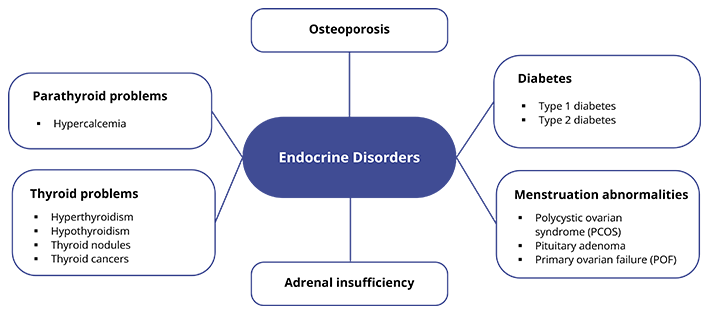The endocrine system is a collection of glands that produce hormones, which regulate metabolism, growth and development, tissue function, sugar and mineral homeostasis, sexual function, heart rate, reproduction, sleep and mood.
The endocrine system is a chemical messenger system, including all glands of the human body and the hormones produced by those glands. In humans, the main endocrine glands are the thyroid and adrenal glands. The glands are directly controlled by stimulation of the nervous system, chemical receptors in the blood and hormones produced by other glands. By regulating the functions of human organs, these glands help maintain the body's homeostasis. The endocrine glands secrete hormones directly into the blood and send signals to body tissues to tell them what they are supposed to do. When the glands cannot produce the proper amount of hormones, the disease will develop, affecting many aspects of life.
Endocrine disorders are usually quite complex due to the feedback mechanisms of the endocrine system, including mixed images of hyposecretion and hypersecretion. Generally speaking, diseases caused by endocrine disorders can be divided into three categories:
Several common diseases caused by endocrine disorders include:
 Fig.2 Common diseases caused by endocrine disorders.
Fig.2 Common diseases caused by endocrine disorders.
The endocrine system coordinates various body functions mainly through the secretion of hormones and their effects on target tissues. In the past few decades, the joint efforts of developmental biologists, geneticists and stem cell biologists have produced a wealth of knowledge about the contribution of stem cells to the organogenesis and self-renewal of endocrine organs.
Induced pluripotent stem cells (iPSCs) are a type of pluripotent stem cells that can be directly produced by somatic cells. Because they can reproduce indefinitely and produce all other cell types in the body (such as pituitary, pancreatic and thyroid cells), iPSCs represent a single source of cells that can be used to replace cells or diseases lost due to injury. Therefore, they are potentially important resources for the application of regenerative medicine. At present, many studies have applied iPSCs to the treatment of endocrine system disorders, and have also played a promising therapeutic effect. The following table briefly lists the corresponding iPSCs therapies for several endocrine diseases, and their cell markers.
Table.1 iPSCs therapies for endocrine diseases.
| Disease | Type of iPSC | Cell Markers |
|---|---|---|
| Type 1 diabetes |
iPSC-derived pancreatic cells iPSC-derived islet-like cells |
pro-inflammatory cytokines (IFNγ, IL-1β, or IFNα) |
| Adrenal insufficiency | iPSC-derived adrenocortical cells | Steroidogenic Factor 1 (Sf1) |
| Hypothyroidism |
iPSCs-derived human thyroid progenitor cells iPSCs-derived human thyroid follicular cells |
Fibroblast growth factors (Fgfs) |
| Pituitary disease | iPSCs-derived pituitary endocrine cells | SRY-box transcription factors (SOX2, 9) |
Because iPSCs can be obtained directly from adult tissues, they can not only bypass the need for embryos, but can also be manufactured in a patient-matched manner, which means that each individual can have his own pluripotent stem cell line. Creative Biolabs enhances the relevance of your research and data by capturing and reprogramming iPSCs from the clinical data of specific patients. Please contact us for more information.
For Research Use Only. Not For Clinical Use.